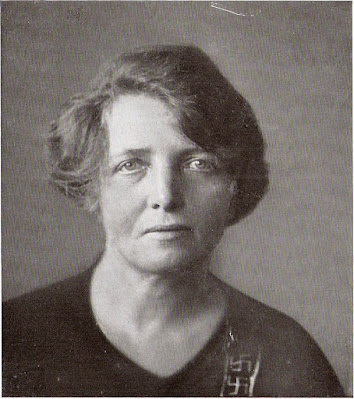Why did Mathilde Ludendorff reject Darwinism
### Mathilde Ludendorff's Rejection of Darwinism: A Critique Rooted in Spiritual Vitalism and Völkisch Ideology #### Introduction Mathilde Ludendorff (née von Kemnitz, 1877–1966) was a German philosopher, neurologist, and völkisch thinker whose intellectual legacy is inextricably linked to her marriage to General Erich Ludendorff and her role in the interwar German nationalist movement. A staunch anti-Semite and critic of organized religion, she founded the "Bund für Deutsche Gotteserkenntnis" (Society for the Knowledge of a German God), a pseudo-religious organization promoting a Germanic spirituality divorced from Christianity, which she viewed as a Jewish imposition. Her seminal work, *Der Triumph des Unsterblichkeitswillens* (The Triumph of the Immortal Will, 1921), serves as a foundational text for her philosophy, blending metaphysics, racial theory, and a rejection of modern scientific paradigms. In this book and subsequent writings, Ludendorff vehemently critiques Charles Darwin's theory of evolution, particularly its mechanistic interpretation via natural selection. Her rejection stems not from empirical disagreement but from a profound ideological clash: Darwinism, in her view, epitomizes soulless materialism that undermines divine will, spiritual immortality, racial purity, and moral elevation. Drawing on her book summaries, historical context, and broader knowledge of her thought, this essay explores Ludendorff's multifaceted critique, arguing that it reflects her vitalistic worldview, where evolution is teleological and guided by an "immortal will" toward Nordic spiritual supremacy, rather than random survival. #### Darwinism as Soulless Materialism: The Denial of Divine Will At the core of Ludendorff's rejection is Darwinism's perceived reduction of life to mechanical processes, stripping it of metaphysical purpose. In *Triumph of the Immortal Will*, particularly Chapter 2 ("Darwinism and the History of Evolution"), she laments Darwin's "selection of the fittest in the struggle for life" as naive and incoherent, transforming evolution—a potential safeguard against materialism—into its promoter. Darwin's emphasis on competition and utility, she argues, buries belief in God and the soul, fostering a "poverty of soul-life" where materialism reigns as a "tragic necessity" for truth-seeking peoples like the Nordics. Ludendorff contrasts this with Arthur Schopenhauer's philosophy, which posits a metaphysical "Will" as the "Thing Itself" (Ding an sich, echoing Kant) driving objectification in forms. Darwin ignores this "sacred mystery," reducing ascent from protozoon to man to practical adaptations (e.g., mimicry, colors) rather than a divine urge for consciousness and beauty. She accuses Darwin of misinterpreting sexual selection (e.g., bird plumage appealing to females) and glorifying cunning/fraud as virtues evolved via selection, demoting morals, art, and soul-harmony to irrelevancies. This mechanical lens, she claims, aligns with "Jewish realism," prioritizing factory-like efficiency over Greek ideals where beauty equals goodness. Her völkisch background amplifies this: As a neurologist with a PhD, Ludendorff rejected Darwinian monism (e.g., Ernst Haeckel's influence) for promoting pluralism of values and denying racial hierarchies. In her Gotteskunde, evolution is not random but directed by an "immortal will" toward spiritual perfection, absent in Darwin's "dry, matter-of-fact competition-struggle." She sees Darwinism as a product of Rousseau's rationalism and Christian terror, decaying Nordic inquiry into nature's laws. #### Rejection of Darwinian Spirituality: False Immortality and Soul Denial Ludendorff's philosophy centers on "God-Cognisance" (Gotterkenntnis), harmonious with science and Nordic blood, rejecting alien religions (Christianity/Judaism) imposed by force. Darwinism, she argues, aids this alienation by denying the soul and God, positing brain faculties as "sum of living brain cells" and evolution as overthrowing creation myths without metaphysical replacement. In Chapters 3 ("The Unicell and Immortality") and 4 ("Natural Death and Reason"), she praises unicell "potential immortality" (Weismann) as evidence of pre-death eternal life, lost in multicells for consciousness ascent. Darwinism's species perpetuity substitutes individual immortality, ignoring racial unity; its "superman" progress (inspired Nietzsche) is false, as ancient cultures show no spiritual evolution beyond accumulated knowledge. Ludendorff views this as tragic necessity for truth-loving Nordics, but Darwinism glorifies it, burying faith and promoting godlessness. She critiques Darwin for vagueness like Schopenhauer's "metaphysical belief," failing to combat materialism/doubt. Evolution reveals divine will toward consciousness, but Darwin mechanizes it, denying soul/God, fostering atheism and uprooting native imagination via alien creeds. #### Racial and Cultural Dimensions: Nordic Vitalism vs. Jewish Fraud Ludendorff's anti-Semitism frames her rejection: Darwinism aligns with "Jewish folk-fraud," historicizing Indian legends (Buddha/Krishna) into Jesus, blending hatred, warping souls. In Chapter 1 ("A New Religion?"), she contrasts Nordic nature-law pursuit (despite Christian persecution) with fetishism/Hinduism, outdated post-Copernicus/evolution/Kant/Schopenhauer. Christianity's superstitions drive logical thinkers to godlessness/materialism. Völkisch ideology: Ludendorff promoted Germanic religion rooted in blood/race, rejecting Darwinism's social Darwinism/monism for questioning Judeo-Christian equality while enabling pluralism she opposed. Her *Gotteskunde* posits vitalistic evolution guided by immortal will toward Nordic superiority, contra Darwin's utility/randomness degrading morals to cunning. Historical context: Interwar Germany, Ludendorff circle rejected Christianity/Darwinism as anti-German; she accused Darwinism of cultural decay, echoing völkisch vitalism (e.g., rejecting matriarchy, promoting mother-right in racial purity). #### Moral Degradation and Alternatives: Utility Over Divine Beauty Darwinism glorifies "Jewish realism," demoting art/morals to pastimes, elevating "factory goods of nature" (practical ones) as life's meaning. Ludendorff counters with dual wills: preservation (practical adaptations) and beauty (manifesting aesthetics survival-allowing). Darwin focuses preservation sacrifices, ignoring sacred mystery/Schopenhauer's Will. She rejects sexual-selection/utility as evolution drivers, favoring beauty/divine urge. Morals degrade: Cunning/fraud virtues; indiscriminate charity harms race. Alternatives: Schopenhauer's metaphysical belief (vague); Aryan cosmic sagas harmonizing faith/knowledge. #### Conclusion: Implications for Ludendorff's Philosophy Ludendorff's rejection of Darwinism is holistic, intertwining spiritual, racial, and moral critiques. It embodies her vitalistic Gotteskunde, where evolution teleologically ascends via immortal will to Nordic God-cognisance, rejecting materialism's soul-denial, utility-focus, and false immortality. By promoting divine beauty/goodness over mechanical survival, she envisions racial purity/spiritual perfection, contrasting "alien" Judaism/Christianity/Darwinism's decay. Though tainted by anti-Semitism, her philosophy critiques modernity's soullessness, urging truth-seeking beyond error-prone reason toward intuitive God-living— a triumph of immortal will over Darwinian despair.



Comments
Post a Comment